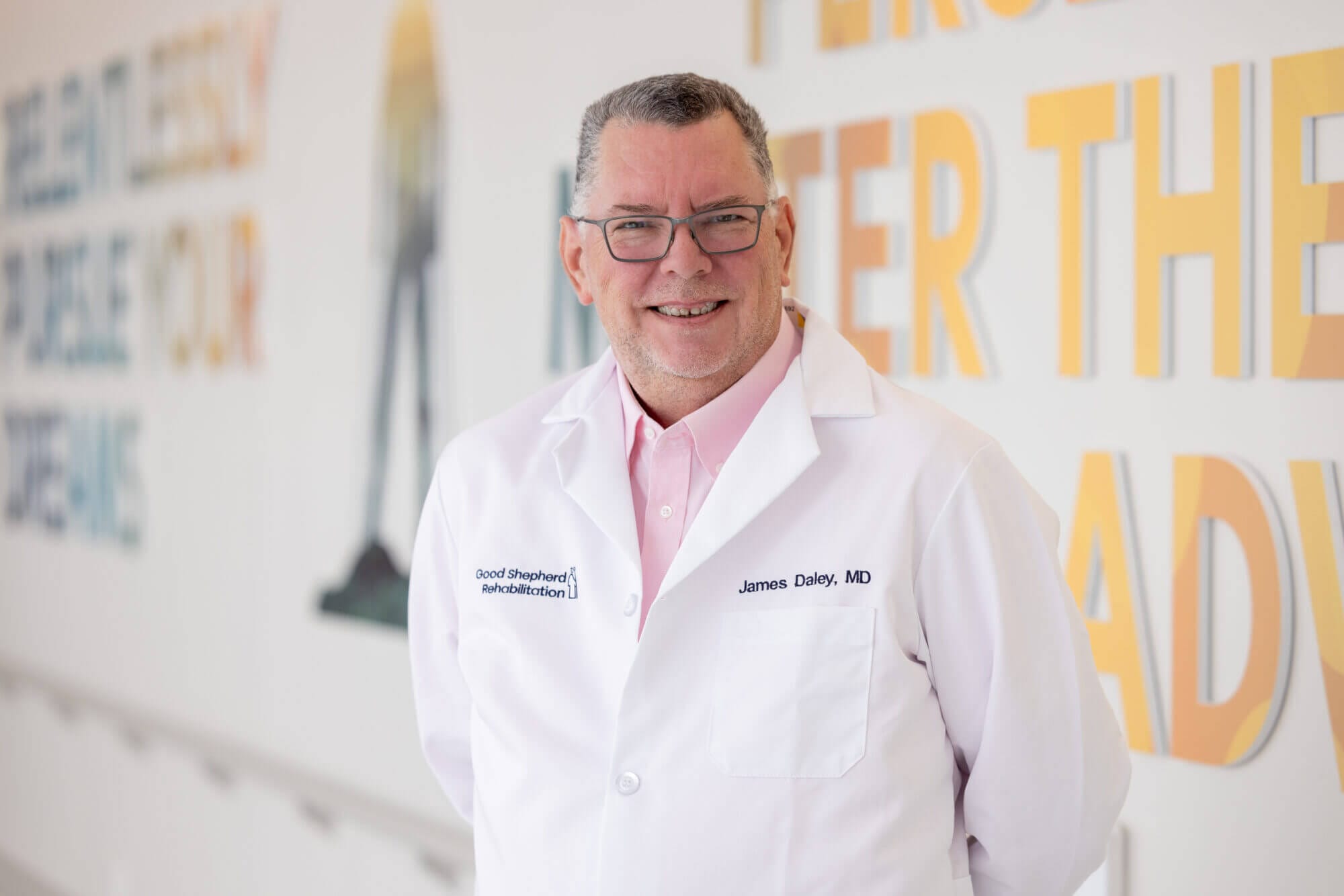Why Choose Us
Learn more about Good Shepherd Rehabilitation Hospital, a destination for recovery for stroke, brain injury, spinal cord injury and complex medical rehabilitation.

Physical medicine and rehabilitation (PM&R) physicians may be the best-kept secret in medicine. They are medical doctors who specialize in restoring function and improving the quality of life for people with physical impairments caused by injury, illness, or disease.
James J. Daley, MD, a Good Shepherd Rehabilitation physiatrist, shares details on the type of care PM&R physicians provide and why they are so important to a patient’s optimal recovery and function.
Dr. Daley: PM&R physicians are experts in diagnosing and treating a wide range of conditions affecting the musculoskeletal system, nervous system and other areas of the body. We are experts in knowing which therapies (physical, speech, occupational, recreational) and modalities (exercise, massage, ultrasound, bracing, orthotics, prosthetics, etc.) to prescribe for a patient’s personalized rehabilitation care plan. PM&R physicians also prescribe medication when necessary.
PM&R physicians go beyond the movement and physical function aspect of rehabilitative care to focus on improving patients’ quality of life and independence. While other physician specialists zero in on the treatment of a condition, PM&R physicians consider the whole patient and the condition’s impact on their lives. We talk to patients about their social, work and home situations, mental well-being and family and community support systems. For example, rehabilitation will be different for each patient with knee arthritis based on whether they live in a one-story or two-story home.
As an amputation specialist, I do not just treat a physical limb. I look at my patients holistically and do whatever I can to help my patients get back to personal and vocational activities. The patient may have a simple goal like attending a child’s soccer game or going to bingo at the local community center. I offer appropriate, personalized guidance to help my patients return to their previous quality of life.
Dr. Daley: The majority of patients seen by Good Shepherd PM&R physicians have experienced a stroke, spinal cord injury or traumatic brain injury. We also treat other neurologic conditions involving the peripheral nerves or central nervous system, including multiple sclerosis (MS) and Guillain-Barré. Patients with musculoskeletal conditions (fractures, athletic injuries), limb deficiency (including amputation) and burns are part of our practice. Pediatric PM&R patients may have birth defects or illnesses that impact their development.
Good Shepherd’s PM&R physicians also work with patients who lose physical function as they age or who have spent a lot of time in the hospital due to a serious disease or condition. We help them improve strength and endurance to counter degenerative impacts on their body.
“Since ‘physical medicine and rehabilitation’ does not roll off the tongue, he coined the terms ‘physiatrist’ and ‘physiatry’ because the specialty looks at the physiology, or physics, of activity and function and applies that to medical treatment.”
Dr. James J. Daley
Dr. Daley: Pain impacts our ability to fully function. It’s not uncommon when you think about pain to automatically think of medication. However, there are more conservative methods to manage pain, and we offer these options to patients – even those already working with a pain management specialist. Modalities like heat and cold therapy, ultrasound, massage and stretching can counteract pain, making patients less reliant on medication.
Dr. Daley: PM&R physicians have training in prescribing durable medical equipment and assistive devices like canes, walkers and wheelchairs. We are the only medical specialty that receives formal training in the development and mechanical function of prosthetics, orthotics and braces.
PM&R physicians go beyond writing orders for off-the-shelf medical equipment. We often write specific instructions for devices and equipment to customize materials and components, achieving greater patient satisfaction and allowing them to return to activities faster.
PM&R physicians are also trained in custom shoe prescriptions for people with diabetes and other conditions.
In conjunction with occupational therapy, PM&R physicians recommend workplace accommodations that allow patients to safely return to their jobs. Plus, we do evaluations for the Pennsylvania Department of Transportation for commercial driver and equipment clearances for patients with disabilities.
Dr. Daley: Every patient’s rehabilitation care plan is individualized and coordinated with medical and community experts to address physical, emotional, cognitive and social needs.
PM&R physicians confer with family doctors, vascular or orthopedic surgeons, and pain management and other specialty physicians. We work closely with physical, occupational, speech and recreational therapists and orthotists and prosthetists. In coordination with care managers, we provide connections for community and vocational support and home adaption.
For patients who are experiencing the psychological impact of their condition, we work closely with psychologists and counselors.
In pediatric rehabilitation, the PM&R physicians have relationships with school district professionals and home tutors, to ensure the child does not fall behind in school.
Dr. Daley: They are the same type of physician; there is no difference between a physiatrist and a physical medicine and rehabilitation physician. Back in the 1950s, there was a Temple University physician who is credited with developing physical medicine and rehab as a physician specialty. Since “physical medicine and rehabilitation” does not roll off the tongue, he coined the terms “physiatrist” and “physiatry” because the specialty looks at the physiology, or physics, of activity and function and applies that to medical treatment.
Dr. Daley: PM&R physicians have a different perspective than many other types of physicians who may just focus on treating a condition. For example, a cardiologist will prescribe cardiac rehab to improve physical endurance, but the focus is not on the patient’s life goals.
Other medical professionals sometimes forget to include PM&R physicians in care plans. That is why I joke that PM&R physicians may be the best-kept secret in medicine.
I encourage patients to ask their doctors if a PM&R physician can be of value in managing or treating their condition while maximizing their function and independence.